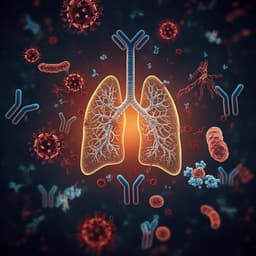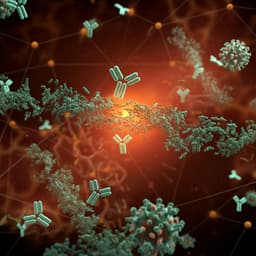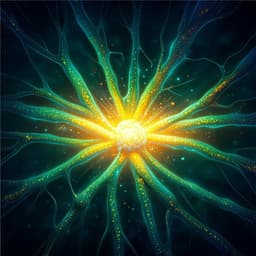
Medicine and Health
Psychological stress impairs IL22-driven protective gut mucosal immunity against colonising pathobionts
C. R. Shaler, A. A. Parco, et al.
This groundbreaking research reveals how psychological stress can disrupt gut immunity and foster the growth of harmful bacteria associated with Crohn's disease. Conducted by a team of experts including Christopher R. Shaler and Alexandra A. Parco, the study uncovers the potential of immunomodulation to restore balance and combat dysbiosis in the gut.
Playback language: English
Introduction
Crohn's disease (CD), a chronic inflammatory bowel disease, is characterized by an aberrant immune response to microbial and environmental triggers. The disease is marked by an altered gut microbiome, often dominated by Enterobacteriaceae, particularly adherent-invasive *Escherichia coli* (AIEC). Clinical evidence strongly links periods of psychological stress to CD exacerbations, suggesting a role for the gut microbiome in the disease's pathogenesis. The rising global burden of CD, coupled with the expense and limitations of current treatments, highlights the urgent need to understand the underlying mechanisms driving CD development and progression. A significant amount of research focuses on the role of the gut microbiome in CD pathogenesis. Characteristics of the CD-associated microbiome include reduced diversity, lower levels of *Clostridiales*, and elevated *Proteobacteria*. AIEC, a pathobiont abundant at inflamed sites in the gut, is consistently enriched in CD patients compared to healthy individuals. AIEC's ability to thrive as planktonic cells, in biofilms, and intracellularly within epithelial cells and macrophages contributes to the inflammatory response. Understanding AIEC colonization dynamics is key to understanding CD progression. Several components of mucosal immunity are compromised in CD, including epithelial barrier integrity, mucus production, antimicrobial peptide (AMP) production, and nutritional immunity. Interleukin (IL)-22, a key cytokine regulating aspects of mucosal immunity, plays a significant role in AMP production and nutritional immunity. However, the role of IL-22 in controlling CD-associated pathobionts remained unexplored. A considerable body of clinical literature establishes psychological stress as a significant disease modifier in CD. Acute psychological stress is associated with CD flares, relapse, and increased inflammatory markers. Rodent models have corroborated these findings, showing increased inflammation, barrier disruption, disease reactivation, and increased susceptibility to enteric infections. While prior studies have examined chronic stress and colitis, the mechanisms underlying the mucosal and microbiological dysfunction associated with psychological stress in the ileum, a crucial region for CD, remain unclear. This study investigated the impact of psychological stress on the gut microbiome and immune pathways, employing a pre-clinical model to elucidate the mechanisms by which stress promotes CD-associated dysbiosis and inflammation.
Literature Review
The literature extensively documents the role of the gut microbiome in Crohn's disease (CD) pathogenesis, highlighting decreased diversity, reduced *Clostridiales*, and increased *Proteobacteria*. The consistent enrichment of adherent-invasive *E. coli* (AIEC) in inflamed sites of CD patients underscores its significance. AIEC's multiphasic lifestyle, including biofilm formation and intracellular survival, contributes to chronic inflammation. Studies have also investigated the compromised mucosal immunity in CD, including defects in epithelial barrier integrity, mucus production, AMP production, and nutritional immunity. IL-22's role in regulating these aspects of mucosal immunity has been established, while its role in controlling CD-associated pathobionts is increasingly being explored. The strong clinical link between psychological stress and CD exacerbation is also well-documented. Stress is associated with flares, relapse, and increased inflammatory markers, and rodent models have shown increased inflammation, barrier dysfunction, and infection susceptibility. However, the underlying mechanisms of stress-induced dysbiosis in the ileum and its interplay with CD remain to be fully characterized.
Methodology
The study utilized a pre-clinical model of acute psychological stress in conventional SPF mice. Mice underwent overnight restraint stress, with a food and water-deprived group serving as a control. The ileal, cecal, and colonic microbiomes were profiled using 16S rRNA sequencing. To investigate the impact of stress on CD-associated pathobionts, mice were colonized with AIEC for 5 days before stress exposure. Fecal and tissue AIEC burdens were enumerated. The impact of repeated stress was assessed over 1 month. To investigate stress-induced morbidity, mice were subjected to DSS-induced colitis with or without AIEC. Inflammatory cytokine expression, barrier function (gene expression and ileal permeability), and bacterial dissemination were assessed. The effects of stress on nutritional immunity (HMOX-1, Nramp1, Lcn2, S100a8, S100a9) were examined. The impact of stress on CD45+CD90+ cells, a source of IL-22, was assessed using flow cytometry. The role of glucocorticoids was investigated using RU486, a glucocorticoid receptor antagonist. The effects of IL-22 depletion and exogenous IL-22 administration were assessed. RNA sequencing of ileal tissue was performed to investigate the impact of IL-22 treatment on gene expression. Statistical analysis included Mann-Whitney tests, one-way and two-way ANOVAs, and Spearman correlation. For flow cytometry, specific cell populations were identified using various antibodies. Explants were used to assess IL-22 production. Bacterial enumeration was carried out via plating methods. RT-qPCR assessed mRNA expression of various cytokines and genes involved in barrier function and nutritional immunity. Enzyme-linked immunosorbent assays (ELISAs) were used to quantify proteins such as Lcn2, S100a8, and corticosterone. DSS-induced colitis models were used to assess the effects of stress and IL-22 treatment on disease severity. Competitive infection experiments using a wild-type and mutant AIEC strain (ΔiroB) were performed to evaluate the role of salmochelin in AIEC's competitive advantage during stress.
Key Findings
Psychological stress led to a significant expansion of ileal Enterobacteriaceae, with *Escherichia-Shigella* showing the most dramatic increase. This dysbiosis was accompanied by reduced bacterial diversity. In an AIEC colonization model, stress caused a substantial increase in AIEC burden, an effect not observed in the food/water-deprived control group. Repeated stress progressively impaired host control over AIEC. AIEC expansion occurred throughout the entire length of the gut. Stress worsened DSS-induced colitis severity in the presence of AIEC. Stress induced an inflammatory response characterized by increased TNF, IFN-γ, IL-23, and IL-17A, along with increased intestinal permeability. Stress also upregulated genes associated with nutritional immunity (HMOX-1, Nramp1, Lcn2, S100a8, S100a9), indicating that stress induced a state of nutritional immunity. A positive correlation was observed between AIEC burden and the expression of Lcn2 and S100a8. Stress caused a depletion of CD45+CD90+ cells, a population producing IL-22. This depletion was glucocorticoid-receptor dependent and was associated with increased Annexin V expression (marker of apoptosis). Blocking glucocorticoid signaling with RU486 prevented CD45+CD90+ cell loss and mitigated AIEC expansion. Exogenous IL-22 treatment significantly reduced AIEC expansion, restored phospho-STAT-3 levels in epithelial cells, and normalized the ileal transcriptome. IL-22 treatment restored the expression of various AMPs, including the Reg3 family, and reduced pro-inflammatory cytokine expression. IL-22 treatment attenuated the stress-exacerbated DSS-induced colitis weight loss. AIEC exhibited a competitive advantage during stress due to its salmochelin production, allowing it to evade Lcn2-mediated nutritional immunity.
Discussion
This study provides mechanistic insight into the interplay between psychological stress and CD pathogenesis. The findings demonstrate that stress-induced glucocorticoids cause a depletion of IL-22-producing CD45+CD90+ cells, compromising gut mucosal immunity. This, coupled with stress-induced nutritional immunity, creates a favorable niche for AIEC expansion. AIEC exploits this environment due to its ability to evade Lcn2-mediated iron sequestration through salmochelin production. Importantly, IL-22 administration successfully countered these effects, highlighting its therapeutic potential in managing stress-induced CD exacerbations. The study's pre-clinical model provides valuable insights into the complex interplay between stress, gut microbiota, and host immunity in CD. Future research should investigate whether IL-22-based therapies can effectively address stress-related CD flares in clinical settings, potentially offering novel therapeutic strategies for managing CD.
Conclusion
This study reveals that psychological stress impairs IL-22-mediated protective immunity in the gut, promoting the expansion of AIEC and contributing to CD pathogenesis. The findings demonstrate that exogenous IL-22 can correct these stress-induced mucosal immune defects and prevent dysbiosis. The data support further research into IL-22-based therapies as a potential treatment for stress-related CD exacerbations.
Limitations
The study's use of a mouse model might not fully recapitulate the complexity of human CD. The acute stress model might not completely reflect the chronic nature of stress experienced by CD patients. The study focused on AIEC, while other bacterial species might also contribute to stress-induced dysbiosis. Further research is needed to fully elucidate the interactions between stress, various microbial species, and the human immune system.
Related Publications
Explore these studies to deepen your understanding of the subject.







